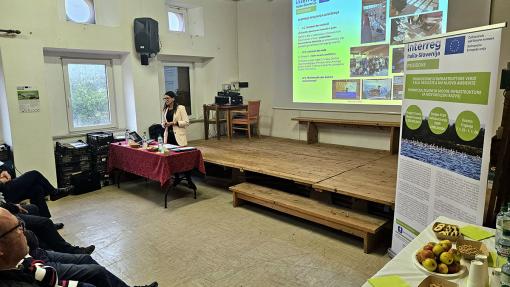In the context of the Poseidon project, implemented within the framework of the Interreg VI-A Italy - Slovenia Programme, the Regional Development Centre Koper (CRS Koper), in cooperation with the local communities of the Karst Edge and with the support of the Municipality of Koper, successfully conducted workshops on the topic of parking areas in this area.
The objective of the workshops was to present the study on parking areas and to gather opinions and suggestions from the local community on this important issue.
The Karst Edge is part of the Natura 2000 network, so it is crucial to consider environmental protection and the search for sustainable solutions when planning and implementing new parking areas. Based on an analysis of the existing parking areas along the entire area, scenarios and proposals for solutions were developed and presented during workshops, in which the participants actively took part by expressing their opinions and suggesting additional improvements.
Among the solutions proposed by local communities are the establishment of parking zones and new parking areas, parking pricing, and improved management and control of existing parking spaces. Mateja Hrvatin Kozlovič, deputy mayor of the Municipality of Koper, emphasised that the parking spaces will be built gradually and in cooperation with the local community.
This means that the local community will be actively involved in the planning stages of the car parks, from the choice of locations to the implementation of the works. In June 2024, an entry point will be opened in Črni Kal for the exploration of the Karst Edge and its surroundings, where a number of new car parks will be available.
The point will serve as a base for visitors and provide information on the natural and cultural sights of the Karst Edge. In the future, on the initiative of citizens, the possibility of establishing a Karst Ciglione nature park will be considered, within which the managing body could manage the car parks in a sustainable manner, ensuring adequate control and protection of the environment.
After the workshops have taken place and the opinions and suggestions from the local communities have been collected, further coordination will begin and short-, medium- and long-term measures for the parking areas will be prepared.
After the completion of these procedures, the preparation of the final version of the study will follow, which will serve as a tool for the future planning of parking areas in the Karst Edge area, with an emphasis on enhancing the sustainable and spatial development of the area.

